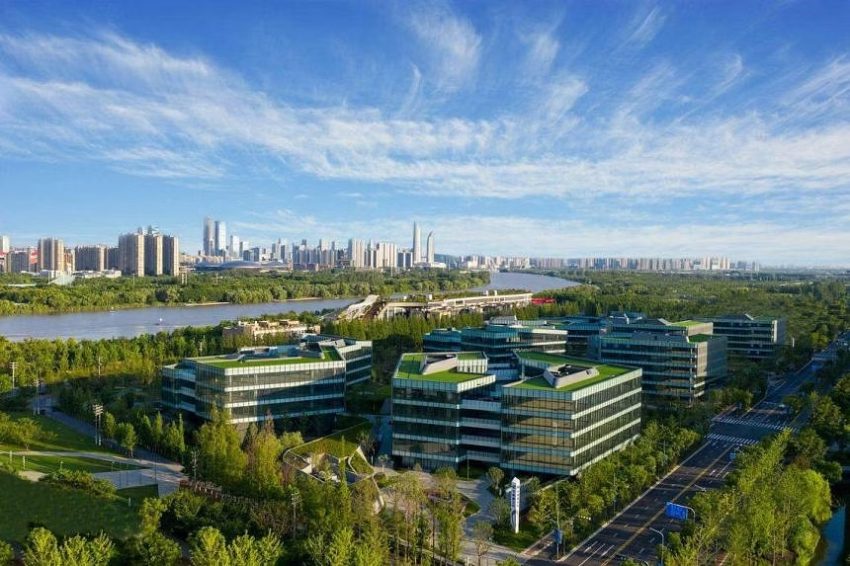
NANJING – Right in the middle of the Yangtze River is an island the size of Pasir Ris, previously best known for its annual grape festival.
But the vines and guest houses that used to dot Jiangxin Island – an islet 6.5km from downtown Nanjing that used to cater to day-trippers from central Nanjing – have largely been replaced by acres of manicured greenery and a clutch of buildings housing the artificial intelligence (AI) units of Chinese tech firms like Huawei, Tencent and iFlytek.
Elsewhere across the island are incubators offering work spaces and collaborative opportunities for companies linked to low-carbon businesses.
As Jiangsu – one of China’s richest provinces – moves towards embracing the green economy, it has tapped Singapore’s expertise in sustainable urban planning, which is evident in the solar-powered office and residential blocks and electric buses that ply the streets of the island.
It is the eastern province’s answer to the bigger, more high-profile Tianjin Eco-City, a project between the Singapore and Chinese governments that will mark its 15th year in September.
Much like the planned city up north, Jiangxin Island, whose name has been changed to the Singapore Nanjing Eco Hi-Tech Island, aims to provide a blueprint of an ecologically friendly smart city.
It is one-part high-tech business park, one-part residential district and one-part waterfront park. There is even a local school for residents.
But the Jiangsu government has its eyes on the island and other science parks in the province to churn out cutting-edge technology as China makes a major push to develop tech self-reliance in the face of growing pushback from the United States and Europe.
Mr Lu Hong, deputy director of the Nanjing Eco Hi-tech Island Economic Development Zone Management Committee, told The Straits Times that he has managed to woo at least 12 companies to set up operations on the island since 2019.
A flagship project under the Singapore-Jiangsu Cooperation Council, it is a collaboration between Yanlord Land Group and Sembcorp Development on the Singapore side and the Jianye District State-owned Asset Management Group and Nanjing Hexi New Town State-owned Assets Management Group on the Chinese side.
Construction on the project began in 2009, when residents on the island were relocated. It took nearly 10 years of infrastructure construction, reshaping the landscape of the island, before it was ready for companies and residents to move in.
Most of these companies work on water treatment, environmental protection, AI and smart transportation. Autonomous driving technology company WeRide has been operating driverless shuttle buses on the island.
Mr Lu said there are plans to build another integrated development that will be carbon-neutral, while more water treatment companies are looking to move into the International Water Hub on the island.

As the province shifts towards focusing on science and technology, as well as the green economy, Mr Lu hopes that more companies in the domain will take advantage of the island’s niche business ecosystem.
During the Covid-19 pandemic, travel restrictions meant entrepreneurs and scientists who wanted to work on collaborative projects were unable to travel to Nanjing, while infrastructure works were also delayed.
“But now that China has reopened, we are back on track again,” Mr Lu said, adding that at least one Singapore water treatment company has moved into International Water Hub.
“The 12 companies (that have set up shop here) are related to the island’s key industries such as water treatment, environmental protection, landscape, artificial intelligence and smart transportation,” he said.
“Hopefully, as we get more publicity in the future, more will find out about us and start to move in.”
During a visit to the island organised by the Jiangsu provincial government, ST saw joggers and cyclists braving a rare sandstorm to navigate a round-island exercise route that recently hosted the Nanjing Half Marathon.
At least two couples were also seen having their wedding photoshoots among the lush greenery.
Jiangsu – whose economy was worth 12.3 trillion yuan (S$2.4 trillion) in 2022, second only to manufacturing powerhouse Guangdong – has been pouring money into science and technology as it competes in the innovation space with other provinces, like neighbouring Zhejiang and Guangdong.
In 2021, investment in science and technology, newly emerging industries like AI research, high-tech firms, and scientific and technical research made up 85 per cent of the province’s gross domestic product, according to data from the provincial economic planner, Jiangsu Development and Reform Commission.

At a meeting of Jiangsu’s delegates during 2023’s Two Sessions parliamentary meetings in Beijing, Chinese President Xi Jinping urged the province to build on its manufacturing strength and to invest in “strategic emerging industries”.
“We need to advance new industrialisation, intensify efforts to re-engineer the industrial foundation and tackle key issues in major technologies and equipment, so as to make the manufacturing sector high-end, smarter and greener,” he said.
To attract such innovative companies to Jiangsu, the local government has rolled out a slew of preferential policies.
In Nanjing alone, companies recognised as “high-tech enterprises” get a reward of 300,000 yuan, with a similar amount on offer for those considered “innovative”.
Elsewhere across the province, research and development parks have been set up in a bid to promote collaborative innovative clusters.
One such beneficiary has been Catug Biotechnology in Suzhou, which set up its company in 2021.
The company, which has production facilities in Suzhou and Wuhan, makes small-batch mRNA vaccines and therapeutics for clients who use them in clinical trials.
“We are in Suzhou Biobay because we want to take advantage of the resources available here,” said co-founder and chief executive Aimee Wang at the company’s Suzhou facilities.
“It’s like the Boston of China, where there are a lot of (research) institutions with access to a lot of local and international talent. On the government level, they have been very professional and offer us a lot of support.”

For researchers or companies without the technical know-how, the province also has the Jiangsu Industrial Technology Research Institute (Jitri), which helps bring research done in university laboratories to market.
Partnering with about 70 domestic universities and 70 more international institutions over the past decade, including the National University of Singapore, Jitri has brought more than 7,000 products to market. These range from batteries for e-bikes to building materials and even semiconductor chips used in medical devices.
Singapore renewable energy company EagleRE also chose to expand into Suzhou after setting up its first Chinese office in Shanghai.
EagleRE group CEO Kelvin Pooh said: “Jiangsu has identified the renewable energy industry to be a pillar of development, with cities like Wuxi setting up industrial zones specifically for renewable energy manufacturing firms with targeted incentives.”
Compared with some other Chinese cities, Suzhou is very foreign investor-friendly, with paperwork such as monthly tax reporting and yearly tax reviews streamlined.
“Officials aim to assist companies to comply with the rules rather than to find fault,” said Mr Pooh, whose company also has operations in Guangdong and Shandong provinces.
Nearly 90 per cent of EagleRE’s projects are in China, creating renewable energy solutions for industrial parks.
For other Singapore companies in Jiangsu, it is the combination of preferential policies, a lush natural environment and proximity to major cities that drew them to set up shop there.

Singapore AI solutions company Mind PointEye has recently set up an office in Yangzhou, about two hours from Shanghai by high-speed rail.
The company was recently involved in developing smart security robots that will be rolled out in Singapore later in May, patrolling several indoor and outdoor venues.
Founder Huang Guangbin said it was Yangzhou’s accessibility and historic culture that drew him to the city.
“Often in our field, you need creativity for problem-solving, and a nice environment promotes that,” Professor Huang said.
“Furthermore, if home prices are affordable, my younger staff will be able to buy their homes quickly, not be distracted about other cost of living problems, and focus their attention on research. It’s a win-win solution.”

